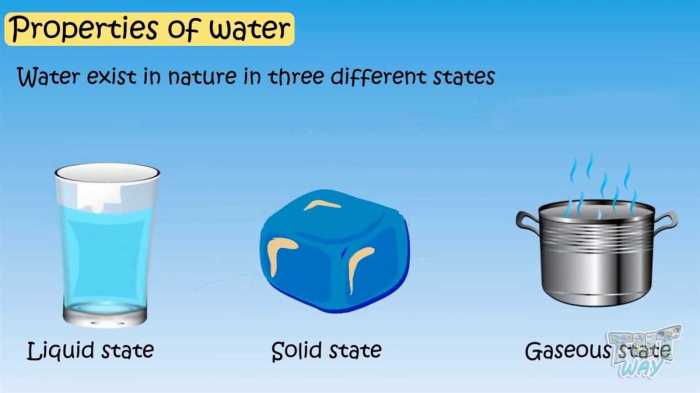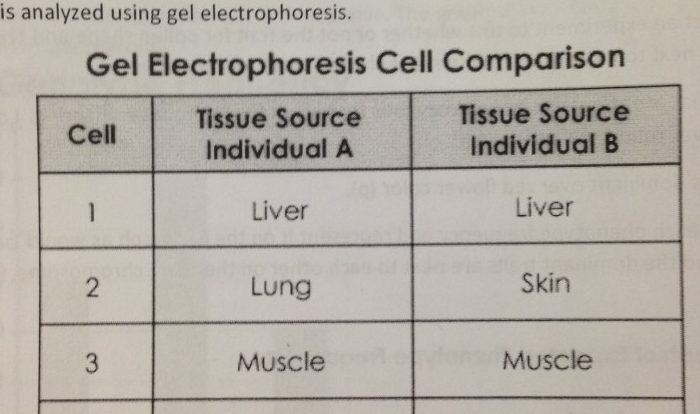Properties of water webquest answer – As we delve into the properties of water, we embark on a journey that reveals its exceptional nature and profound implications in biological, chemical, and physical systems. Water’s distinctive characteristics, including its high surface tension, polarity, and exceptional solvent power, have shaped its multifaceted role in supporting life and shaping our planet.
This comprehensive exploration of water’s properties will shed light on its ability to dissolve a wide range of substances, regulate temperature, exhibit unusual density behavior, and facilitate capillary action. By understanding these properties, we gain a deeper appreciation for the intricate workings of water and its indispensable role in our world.
Properties of Water: Unique Characteristics
Water possesses a unique set of properties that distinguish it from other substances. Its high surface tension, polarity, cohesive and adhesive forces play crucial roles in biological processes.
- Surface Tension:Water has a high surface tension due to the strong cohesive forces between its molecules. This property allows water to form droplets and beads, which is essential for many biological processes, such as water transport in plants.
- Polarity:Water is a polar molecule, meaning it has both positive and negative charges. This polarity enables water to dissolve many ionic and polar substances, making it an excellent solvent.
- Cohesive Forces:Water molecules exhibit strong cohesive forces, which means they tend to stick together. This property contributes to water’s high surface tension and its ability to form droplets.
- Adhesive Forces:Water molecules also exhibit adhesive forces, which allow them to adhere to other surfaces. This property is important for water’s ability to transport nutrients and minerals through plant tissues.
Solvent Properties: Dissolving Power
Water is an exceptional solvent due to its ability to dissolve a wide range of substances. This property is essential for many biological and chemical processes.
- Polar Substances:Water can dissolve polar substances, such as salts, sugars, and alcohols, because its polar molecules interact favorably with the polar molecules of the solute.
- Nonpolar Substances:Water can also dissolve nonpolar substances, such as oils and fats, through hydrophobic interactions. In these interactions, the nonpolar solute molecules cluster together to minimize their contact with water.
- Universal Solvent:Water is often referred to as the universal solvent because of its ability to dissolve a wide range of substances. This property makes water essential for many biological and chemical systems.
Thermal Properties: Heat Capacity and Temperature Regulation

Water has a high heat capacity, meaning it can absorb or release a large amount of heat without a significant change in temperature. This property plays a crucial role in temperature regulation.
- Heat Capacity:The high heat capacity of water is due to the strong hydrogen bonds between its molecules. These hydrogen bonds require a lot of energy to break, which means that water can absorb or release a lot of heat without a significant change in temperature.
- Temperature Regulation:Water’s high heat capacity helps to regulate the Earth’s climate and weather patterns. Oceans and lakes absorb heat during the day and release it at night, which helps to moderate temperatures.
- Body Temperature:Water’s high heat capacity also plays a role in maintaining body temperature in living organisms. Water absorbs heat when the body is too warm and releases heat when the body is too cold, helping to maintain a stable internal temperature.
Density Anomalies: Expansion and Contraction
Water exhibits unusual density behavior, specifically its expansion upon freezing. This property has important implications for aquatic life and ecosystems.
- Expansion upon Freezing:Water expands when it freezes, unlike most other substances that contract. This is because the hydrogen bonds between water molecules form a more open, less dense structure when water freezes.
- Aquatic Life:The expansion of water upon freezing has important consequences for aquatic life. Ice floats on water, which prevents lakes and oceans from freezing solid. This allows aquatic organisms to survive in cold climates.
- Industrial Applications:The density anomalies of water have implications for industrial applications. For example, water pipes can burst if they are not properly insulated, as the expanding ice can create high pressure.
Surface Properties: Capillary Action and Meniscus Formation: Properties Of Water Webquest Answer
Water exhibits unique surface properties, such as capillary action and meniscus formation, which have important applications in biological systems and industrial processes.
- Capillary Action:Capillary action is the ability of water to rise in narrow tubes against gravity. This property is due to the cohesive forces between water molecules and the adhesive forces between water molecules and the walls of the tube.
- Meniscus Formation:When water is in a container, it forms a meniscus, which is a curved surface. The shape of the meniscus is determined by the relative strengths of the cohesive and adhesive forces.
- Biological Applications:Capillary action is important for water transport in plants and other biological systems. It allows water to move through narrow tubes, such as xylem vessels in plants.
- Industrial Applications:Capillary action is also used in industrial processes, such as chromatography and capillary electrophoresis, which separate mixtures based on their different affinities for the stationary and mobile phases.
Frequently Asked Questions
What is the significance of water’s high surface tension?
Water’s high surface tension allows it to form droplets and bead up on surfaces, contributing to its cohesive nature and enabling processes like water strider locomotion and raindrop formation.
How does water’s polarity affect its solvent properties?
Water’s polarity enables it to dissolve polar molecules and ionic compounds by forming hydrogen bonds, making it an excellent universal solvent.
Why does water expand when it freezes?
Water expands upon freezing due to the formation of hydrogen bonds between water molecules, creating a less dense crystalline structure.
What is capillary action, and how does it work?
Capillary action is the ability of water to rise in narrow tubes against gravity due to the cohesive forces between water molecules and the adhesive forces between water and the tube walls.

